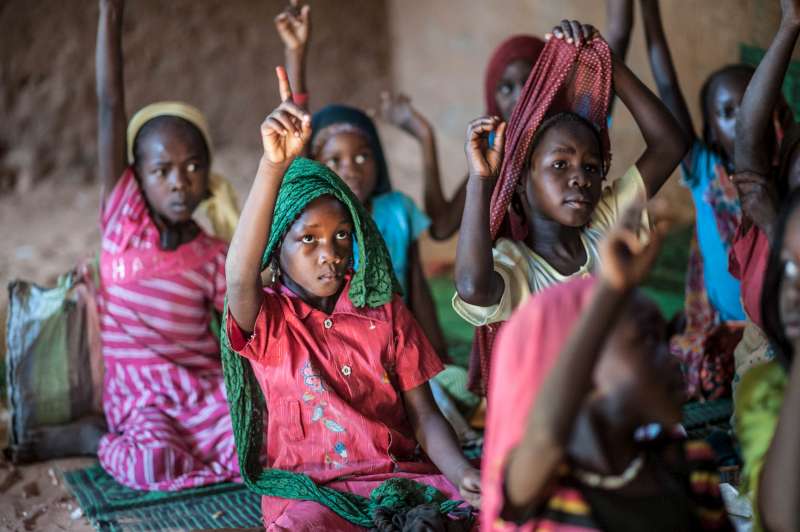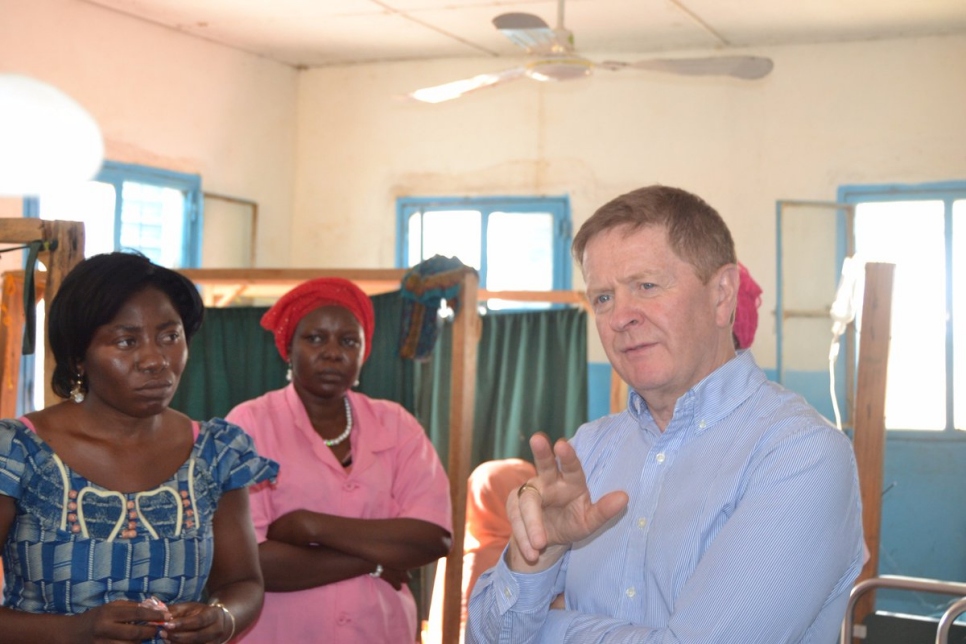Interview: Limerick man Edward O'Dwyer is Deputy Representative for Protection in Chad
Home to over 400,000 refugees, Chad remains a welcoming place of safety for those forced to flee
“At the time, it was not my intention to join the UN,” says Edward O’Dwyer.
In the early 1990s, the Limerick man was working with a Galway based computer software company when it closed, leading him to consider a career change.
He joined the UN Volunteer programme in Cambodia in 1992, but soon after was deployed with UNHCR in the former Yugoslavia, where a devastating conflict had created the worst refugee crisis in Europe since World War II.
”I was drawn by events there and it seemed like the right thing to do at the time.”
Some 25 years later, he is still passionate about working with refugees and asylum-seekers around the world. Since January 2017, he has been stationed in Chad in the role of Deputy Representative for Protection, an often challenging and very interesting assignment.
“The current situation is quite difficult”, explains O’Dwyer. “Over the past few years, Chad has experienced an economic crisis as its petrol revenues plummeted due to global oil prices and conflict and instability in neighboring countries led to border closures and the disruption of trade. In this context UNHCR is supporting the government to protect and find solutions for more than 630,000 people in Chad. This includes about 430,000 refugees, 157,000 internally displaced people as well as Chadian returnees from the Central African Republic and Nigeria and Chadian refugees from Darfur in the Sudan.”
Conflict zones
Sharing a border with Libya, Sudan, the Central African Republic, Cameroon as well as Nigeria and Niger, the land-locked country is located in-between some of Africa’s most notorious conflicts.
“Insecurity related to the Boko Haram terrorist group in the Lake Chad region has led to over 157,000 people being displaced or affected by displacement within Chad near the border with Nigeria. People who previously were obliged to move their homes to follow the receding waters of the lake in order to maintain their livelihoods in fishing and agriculture are now forced to move again due to violence and attacks on the civilian population by Boko Haram.”
According to O’Dwyer, Islamic terrorism posed a threat not just to Chad but to the broader region.
Boko Haram puts the whole area under stress. This element of extremism needs attention.
“Boko Haram puts the whole area under stress. This element of extremism needs attention. If communities don’t have protection they are either forced to flee or they fall prey to their captors.”
On top of all of this, renewed fighting in the Central African Republic has triggered large movements of people towards Chad. “21,000 people have entered into Chad since Christmas alone and we understand more are arriving as we speak. This is very worrying,” he says.
In the context of instability in the region, Chad has been a safe haven, offering security and protection to large numbers of refugees over the years. However, this regional instability has left its mark on the country’s economy and has negatively impacted the resilience of communities and families to make ends meet. This has been a harsh set back following the more successful years of the petrol boom, which began in 2003.

Child refugee Zoera, in faded red dress with green headscarf, attends class at Djabal camp in Chad Young Sudanese refugees are being integrated into Chad's school system, with the support of UNHCR and Educate A Child Programme. © © UNHCR/S.Cherkaoui
Falling oil prices and humanitarian aid
“The petrol industry gave Chad a new lifeline to complement its existing base. Before that, its biggest industries were cattle, agriculture and cotton.” When the growing insecurity in the region led to the country’s decision to close some of its borders, the situation changed. “The cattle industry was highly dependent on cross-border trade. That wasn’t possible anymore. When the petrol prices started going down as well, Chad entered a deep economic crisis,” he says
Progressive reductions in the levels of humanitarian resources available in Chad have made the situation even more precarious. “Both UNHCR’s, as well as the World Food Programme’s funding, have been reduced over the last few years at a time when the numbers of people of concern have continued to increase. UNHCR Chad’s operational budget had reduced by 50% since 2013”, he says. “This has a direct and negative impact on the general protection environment and well-being of families, particularly women and children who are exposed to the most serious risks to their person and dignity. The problem is, that Chad, or at least N’Djamena, looks better to the eye than it actually is when reality reveals itself. During the petrol boom, a lot was invested in infrastructure but nobody was investing in the human capital which the country so badly needed. We can feel that now.”
Today, more than a quarter of Chad’s own population is in need of humanitarian aid due to food insecurity. “This situation has a direct impact on families, particularly children. It often means families can’t send their children to school, or they have to choose which of their children will get to go. It is usually the girls who end up staying at home.”
...people here tend to be very welcoming. There is a huge tradition of asylum on the African continent.”
Tradition of asylum
Despite all this, Chad’s population remains welcoming towards refugees and asylum-seekers, says O'Dwyer. “Think of Chad as a country of great hospitality. Africa, in general, is very specific in this regard as people here tend to be very welcoming. There is a huge tradition of asylum on the African continent.”
To improve the situation and get people out of their dependency on humanitarian aid, UNHCR is working closely with development agencies as well as the government of Chad toward the socio-economic inclusion of refugees. High up on this year’s agenda: giving refugees the right to work.
“Refugee’s access to the labour market is still quite restricted. We are supporting the government to lighten the administrative procedures and facilitate inclusion. Implementing refugee legislation would allow refugees to stimulate the economy here in Chad.”
It’s a highly charged brief, but one that the occasional trip home helps him get ready for. “I go back to Ireland a few times every year. It’s good to fill up the batteries.”

